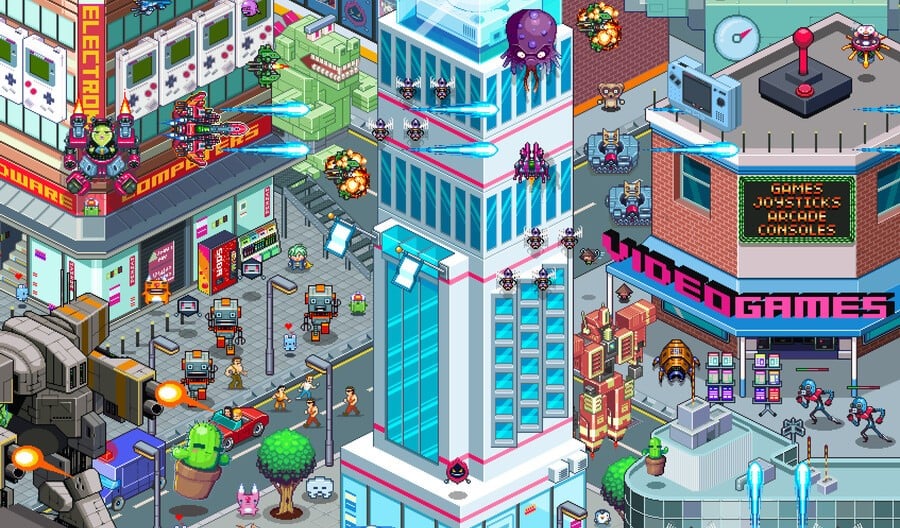
Ten years ago, I was given the great privilege of living in Japan for three months to interview a diverse and eclectic range of game developers. This would produce three volumes in the The Untold History of Japanese Game Developers series (plus a DVD). Looking back, through faded memories, I still can't quite believe it happened or how much time has passed since then. The intervening decade is now longer than my career in journalism which preceded the trip (having started around 2004). Join me, readers, as I attempt to recount a wild adventure of tropical typhoons, insane litigation, and fish testicles. Also interviews. There were definitely a few interviews done.
I had funded this escapade through Kickstarter; according to Kicktraq, it ran from 27th May until 30th June (2013), receiving 1,549 backers and £70,092 (approximately $89,100). After fees, I got around £60,000 (around $76,271) in my bank account. At the time, I described my motivation in depth, but basically, I loved the long-form interviews in the Family Computer 1983-1994 book and was frustrated both by the lack of interviews with Japanese game devs in English, and the fact those which existed were always with the same people.
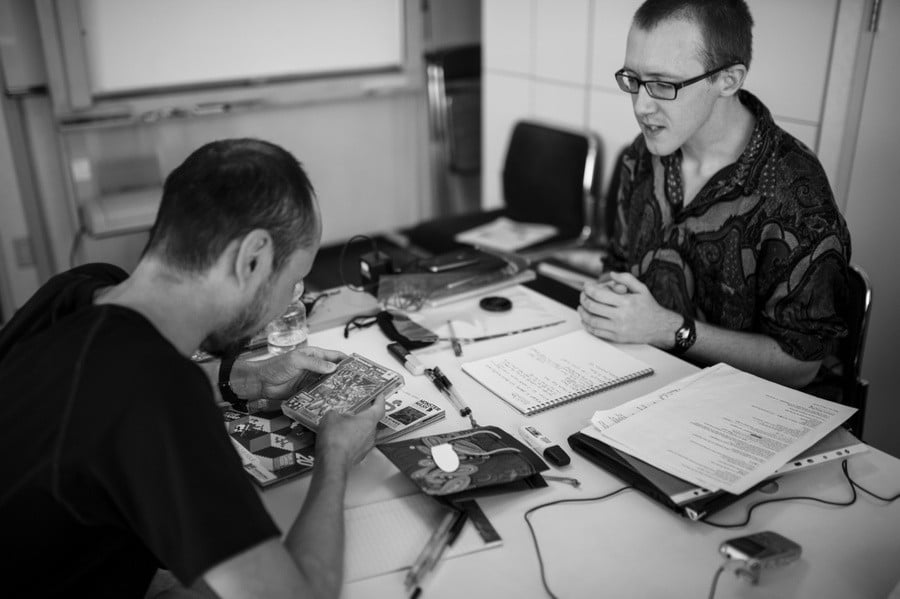
Already having years of journalism experience, and contacts, building a list of willing interviewees was easy. Maybe too easy, since my first mistake was continually name-dropping potential interviewees to gain public interest. In Japan, even more came on board. By the time I returned home, I had over 85 interviewees – obviously too many for the single book I promised. I ended up writing three books, but backers would only receive the first. Given printing costs, there were few alternatives.
But we're getting ahead of ourselves...
Heading To The East
After the Kickstarter campaign ended, I needed a new ruggedised laptop for travelling, a Lumix camera for video and photos, a dictation machine, plus hiking shoes and a backpack. Also, a means of bringing half that money into Japan; some was in cold raw cash, the rest in traveller's cheques. Which, to my surprise, were still a thing!
Joseph Redon of the Japanese Game Preservation Society also contacted me, acting as a liaison, advisor, and in a way, silent partner. He never made demands, offering only invaluable aid at no cost. He arranged for a professional photographer, Nico Datiche, to travel with me on every excursion, and also provided me with an iPhone for daily use. I owe these two gentleman a debt of gratitude – some of the more challenging and interesting interviewees were found through Joseph's contacts list. Nico meanwhile showed up on time, every day, no matter the weather or distance to travel, and stayed no matter how long it took. I can't imagine how he felt, being dragged around Japan by an Englishman, but I valued his company as much as his photos. He'd only relocated to Japan that year and his rates were generous, while the quality of his photos speak for themselves.
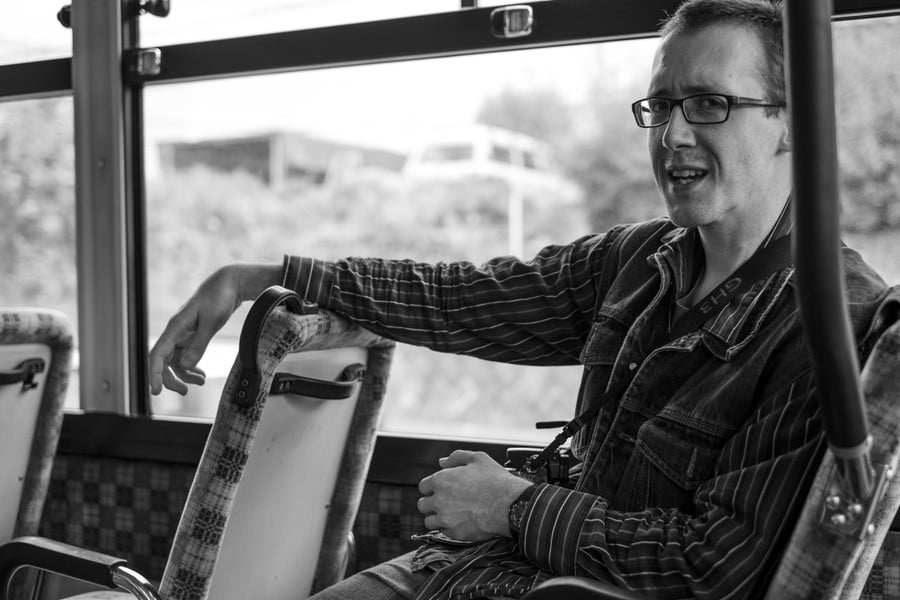
I flew business class (comfy!). At the airport, I was rushed by a Japanese TV crew for a program where they ask foreigners questions – I explained who I was and was asked about my top five Japanese video games. I never found out if they actually aired it or not. I can't even remember what I said; probably something obscure. My apartment was arranged through Sakura House – situated above three family-run restaurants on the outskirts of Tokyo and quite nice. (It was also better than renting through a traditional landlord, because I refuse to pay anyone reikin!) It was based in Shin Egota, on the Western edge of Tokyo, served by the Toei Ouedo Line, and was home for the next three months, starting in September.
When I look back on organising those three months, I'm amused at how I'd used the lowest-tech method possible. Kurt Kalata of HG101 kindly allowed me use of his website server to place three calendar images, which I linked interviewees to, asking they suggest three or more convenient dates, after which I would colour the block in red to show it was unavailable. Someone had suggested an online calendar where interviewees could just amend it themselves, but I wanted absolute control of this, in order to facilitate convenient travel between morning and afternoon meetings. Ultimately it worked; of those three months, I had a rest day roughly only once every ten days. (Kurt's dad would also later edit the DVD of the trip; so the whole Kalata family has my sincere thanks.)
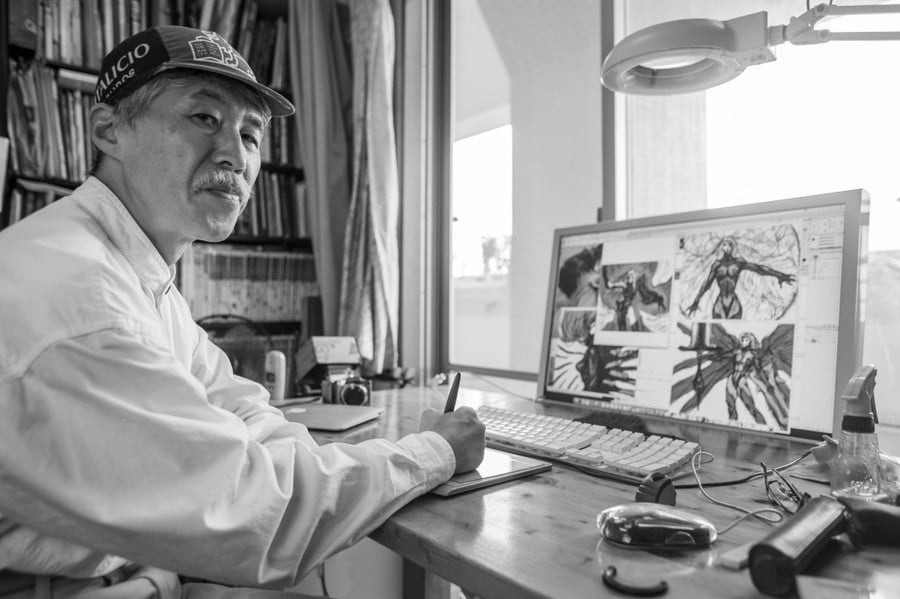
Meeting Your Heroes
HG101 has contents pages for each book (V1, V2, V3) which details who I spoke to. It was a lot of cool people, who opened up to share deeply personal aspects of their lives. I'll try to give a chronological rundown of a few, along with dates. There were too many to recount all of them.
Roy Ozaki and Kouichi Yotsui (15th September 2013)
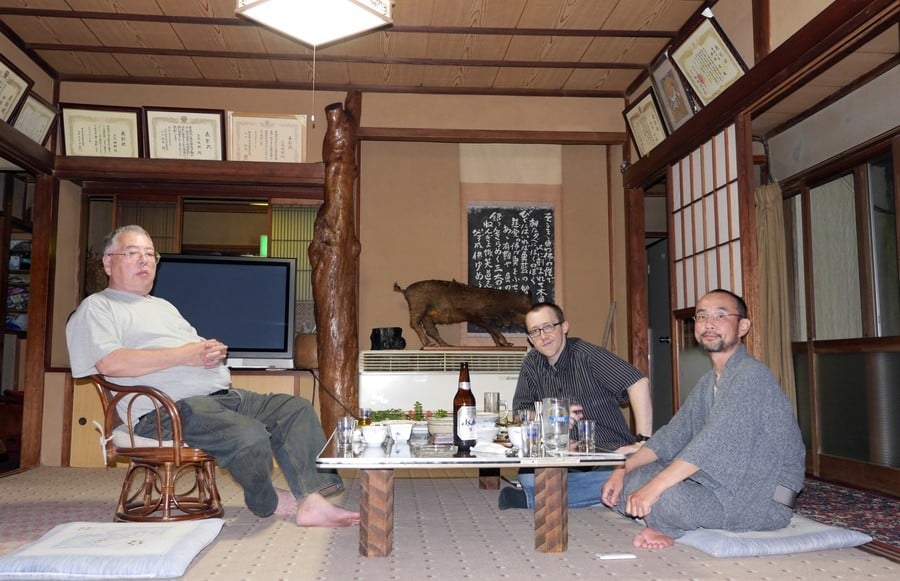
For two days, I hung out with the creator of Strider and the founder of Mitchell Corporation. We ate noodles on Mt Takao, drove through the wooded hillsides, and spent the evening at a small Japanese inn – there ended up being seven hours of audio. Yotsui-san wore a traditional yukata that evening, and we ended up drinking a lot of beer and warm sake while discussing yakuza in games.
The next day I was invited to Ozaki-san's house to rummage through old game design materials (I took a lot of photos and video). While unpacking a cupboard I came across a mysterious box without markings. Lifting the flap, I froze in horror – there were six human heads inside, with neat, long black hair. My immediate thought was: would I be next? No one would find my headless corpse, buried on Mt Takao. Just as my heart was about to explode, he says: "Oh, my wife's a hairdresser. Those are her practising heads."
Ryuichi Nishizawa of Westone (17th September 2013)
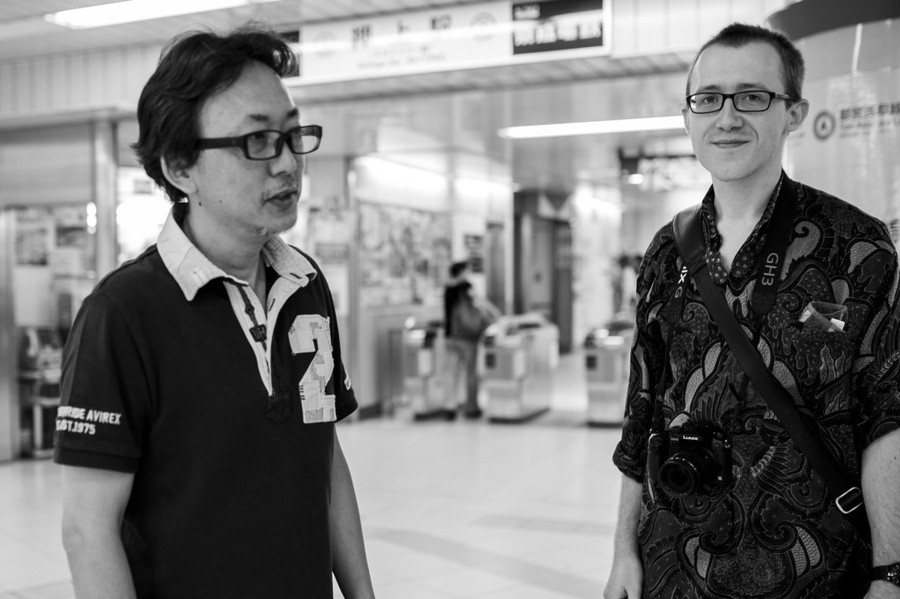
The first Famicom game I played was not Mario but Adventure Island, which was a reskin of Nishizawa-san's original Wonder Boy, so this was an especially fun meeting. He showed me his collection of Wonder Boy dioramas, used for the games' covers. I spent the day chatting with him and also artist Maki Ohzora, plus a second interview with Yotsui-san. As a gift, I gave Nishizawa-san a copy of Wonder Boy in Monster Land on the ZX Spectrum, and Yotsui-san a copy of Strider on the C64. My plan was, where possible, to give interviewees the British home computer conversions of their games – the likelihood is they had never seen them, and it seemed like a nice way to showcase the fact these games were loved globally. Almost every interviewee expressed surprise their games were popular outside Japan.
Tokyo Game Show (19th September 2013)
Busy as always! I met and interviewed Yusaku Yamamoto, GameSide magazine's editor; Yasuhide Kobayashi, producer on Sky Odyssey, Mister Mosquito, and ICO; Jeremy Blaustein, localiser on Metal Gear Solid; Harry Inaba, localiser on Suikoden (who arranged an interview with the creator of Suikoden!); plus I made contact with Rica Matsumura for several later interviews.
Indie Stream Party (22nd September 2013)
This turned out to be a super awesome 'who's who' of cool people. I was there at the invite of Kouji Yokota, a legendary designer on multiple games, including Illusion of Gaia. So we're eating buffet sushi, discussing how he missed the days of being hands-on, since now he's a CEO. Could Japanese indie development be the next big thing? And we're brushing shoulders with the equally legendary Yoshiro Kimura, who kindly promised to introduce us to fellow legend ZUN. Former EGM editor James Mielke was there and we exchanged business cards (this becomes important later), as was Insert Credit founders Tim Rogers and Brandon Sheffield, plus GameFan alumni Mollie Patterson! Jeremy Parish of Retronauts was also there, but he refused to exchange business cards saying he didn't have enough, and then declined to accept mine when I said he could have it anyway.
Yuzo Koshiro (24th September 2013)
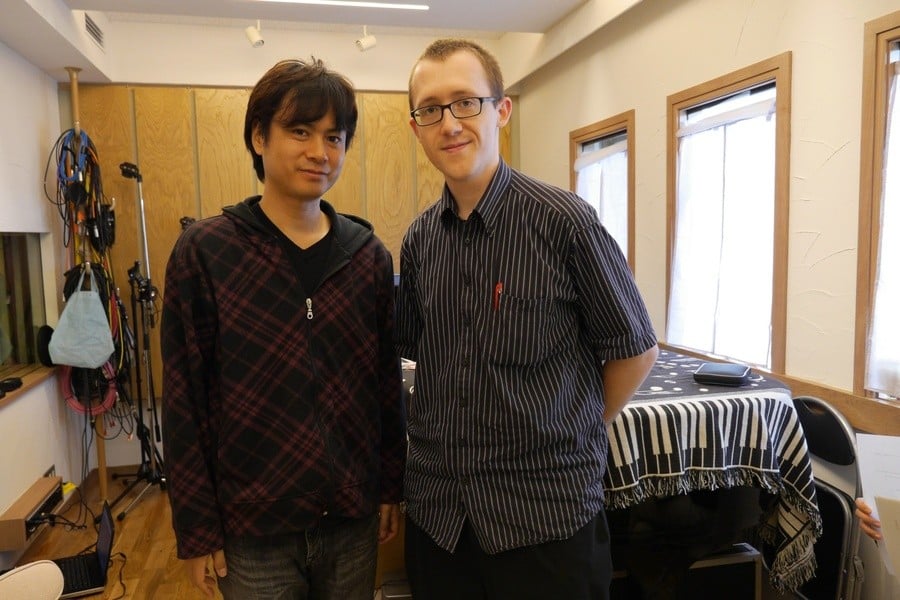
I visited his home, where his mother made us lunch! I seem to recall it was English-style finger sandwiches with a selection of toppings. Koshiro-san described how his company Ancient was family run; details of the planned but cancelled Streets of Rage 4 for Dreamcast; also we played some of the homebrew computer games he made in his youth. The man also has an enormous collection of video game OSTs. I asked about hiring him to compose music specifically for the DVD; Koshiro-san explained his schedule was too busy to do it in time, so gave permission to use some of his older music royalty free!
Yutaka Isokawa (30th September 2013)
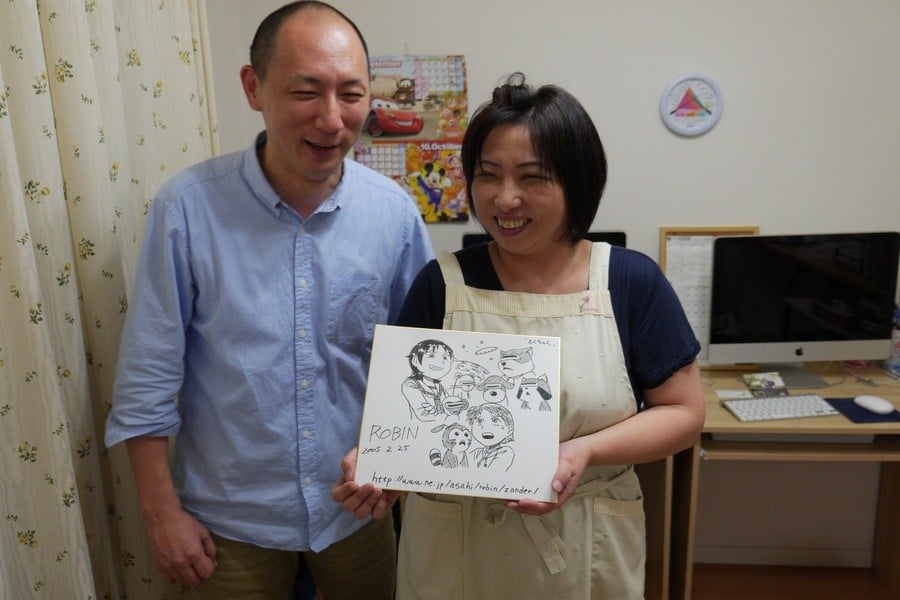
This was a feel good interview. Earlier in the day I was taken to a very fancy lunch by Tomonori Sugiyama and Yutaka Isokawa, after which I interviewed both for several hours (some great Lunar anecdotes). That evening I then visited Isokawa-san's home, where his wife cooked us Japanese-styled curry rice for dinner, and we went through the box of items he'd developed. Notably he'd created the original Pitman / Catrap, and I knew that he'd lost his copy of the magazine with the original type-in listing. So with the help of Sam Derboo on HG101, we acquired a copy of the magazine and gifted it to Isokawa-san – the video is great. He also described the creation of Namco's NeGCon controller.
Hudson in Hokkaido (7th-8th October 2013)
Organised by Joseph, we flew to the northern island of Hokkaido for a couple days. We visited the abandoned Hudson laboratory and made some shocking discoveries interviewing dB-Soft staff (Yasuhito Saito, Takaki Kobayashi, Keita Abe). We mentioned the lab and one said: "Oh, you like Hudson? Let me call my friend, he was one of the original staff at the company's start." The next day we were chatting with Takashi Takebe, who gave great inside info on Hudson's fondness for the ZX Spectrum, and Nintendo's earliest forays into games.
Other highlights included dinner with Kobayashi-san and Abe-san (we ate fresh sea cucumbers and drank a lot of sake), spending the night in a capsule hotel, exploring the local Ainu culture, and later trying a gourmet sushi platter that included fresh crab brains!
I also met professional translator Matt Fitsko, who quite literally saved the project when he later took on the arduous task of transcribing the original spoken Japanese (more on that in a moment). We were on a train when he suggested it, offering mate's rates for the work. I handed him a wad of bills and he promised to refund leftovers at the end. Well, two years later and I ended up wiring him money every month to keep transcribing – at the same shockingly low prices. I often wondered if he regretted making such a deal; he never once raised complaints. In later years, I would joke that it was like that scene in Forrest Gump.
Kansai (11th-13th October 2013)
This was mainly to interview the mysterious Kensuke Takahashi, formerly of Xainsoft, and Masaaki Kukino, formerly of Konami. But it also gave me the opportunity to meet my old friend Yuko, who I'd known since studying Japanese at school. She was horrified at the behaviour of those who tried to sabotage the project (again, I'm getting to that bit shortly), stating they were not like normal Japanese people, and she put me in touch with some legal friends in Japan.
I also crashed at the flat of former journalist Sergei Servianov. We met a friend of his, Dan, and a lot of that evening I'm probably not allowed to retell as they've since both gotten married (they gave a tour of Tobita Shinchi; purely for observation!). At one point we wanted food and ended up in a dodgy area full of smoke-filled mahjong parlours, and discovered a place showcasing live soft-shell turtles for the menu. I snapped a photo but we never actually ate turtle. Instead we went for shabu-shabu. (A normal shabu-shabu establishment, before you start thinking anything.)
Yoshiro Kimura (25th October 2013)
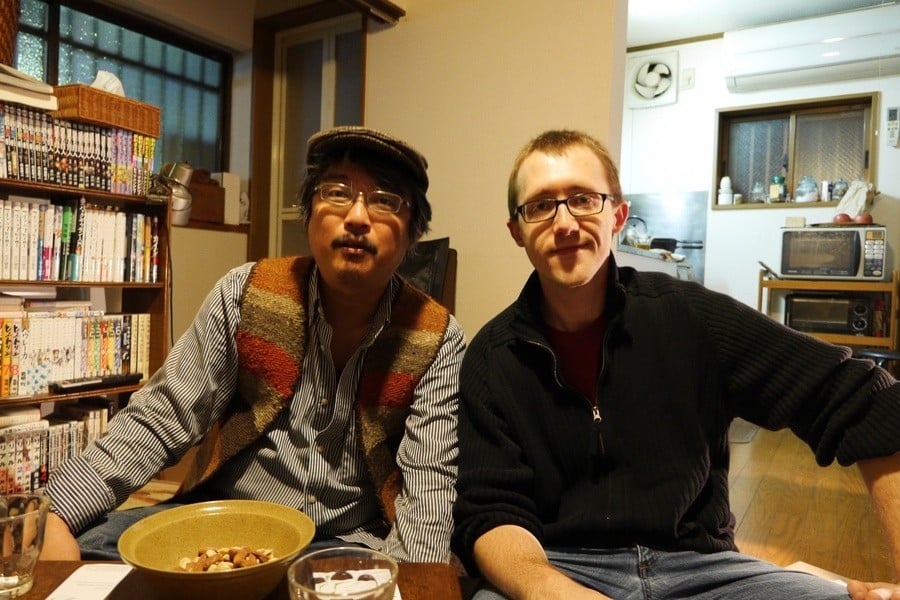
Kimura-san brought the beer, I brought the pizza. We then discussed the challenges of being an artist, what his family thought, his fears of being homeless, and the joys of creativity. He also showed me his personal art and a board game he created. It made for a great interview as Kimura-san gave emotional and detailed replies.
Nakano Broadway (15th November 2013)
In my handwritten diary from that time, I described Akihabara as dead. It had changed drastically since I was there in 2003, and much of the video game focus was gone, replaced with cafes. However, another place I discovered, which isn't talked about as much, is Nakano Broadway! Ostensibly a shopping mall, most of its stores also act as museums for their chosen product – several contained toy rarities from over 50 years ago. I found one store selling classic Japanese magazines, and bought as many as I could carry. I also bumped into Benjamin Peray of Pix'n Love. We met before, but it was pure coincidence when we met again. We went for dinner at an Okinawan restaurant. I decided to play menu roulette since neither of us could decipher all the kanji in the name of a particular fish dish. It looked a little bit like brains and was very creamy. Later on, I would discover it was milt, or fish testicles!
TV crew (various dates, 2013)
Hifumi Kouno, the creator of Steel Battalion, was a cool interview. He was impressed when I told him how, in my youth, I'd built a Steel Battalion cockpit using a portable TV and several huge cardboard boxes. He was also impressed with my Kickstarter project, expressing an interest in running his own, and putting me in touch with a TV crew who were making a documentary about crowd-funding. He arranged for them to join me for three of my interviews, paying for an extremely professional interpreter for me to use, and then a few months later, I was on TV!
Litigation: Insane, Unprovoked, And Frankly Just Plain Evil
For all the positives I've described, a lot also went wrong. In fact, so much went wrong on the trip it's difficult to know where to begin or how to convey it. When I arrived, Typhoon Man-yi was hitting Japan, resulting in me being blown off my feet and falling – quite literally – in a rain-filled gutter, whereupon water gushed through the gap of my collar, turning my shirt into a windsock filled with said water.

The worst problem was that the interpreters (arranged via an individual named Hanako Abe), who I had been assured were the best of the best, turned out to be terrible. I had not done proper vetting beforehand and only discovered this midway through the trip after Joseph Redon took notes during a sit-in (citing numerous mistakes), and I travelled to Hokkaido and hired an independent interpreter. She was half the price, declined to take a break, and informed me that – having once interpreted for the Japanese Emperor – this was the easiest job she'd ever had. The interviews, from her perspective, were simply chats about life, and that my interpreters in Tokyo, who had started demanding longer and longer breaks – and two of them simultaneously for tag-team interpretation – were simply milking me for my money. She also made zero errors, after Joseph Redon and Takayuki Komabayashi went through the audio.
I was paying Hanako's interpreters 80,000 yen a day. There's been some inflation, and currency rates have changed after 10 years, but let's just give it a quick and dirty conversion: that's something like over £450 / $600 a day, per person. A couple of weeks in, Hanako started saying that the interviews were too complex and I should hire two interpreters (double the fee) and have them work tag-team. Her moving of the goalposts pushed me over the edge. Later I would discover all the interviews done by her interpreters were junk, requiring Matt Fitsko to sit, painstakingly, and transcribe the original spoken Japanese into English.
After this demand to hire two interpreters, I cut ties with Hanako, even though she owed me money I'd paid in advance. She'd suggested I pay her the entire project's fees in advance – thank the gods I refused this and only paid a smaller amount. After cutting ties, I sent an emergency email to James Mielke, who put me in touch with Active Gaming Media, where I corresponded with Joshua Weatherford, and AGM then supplied me with actual professional interpreters (at a lower price too). This is what I should have done from the start: gone to a reputable agency. The trip carried on, I got good results with my new interpreters, and I returned home.
However, once home, I witnessed one of the most monstrous acts of hateful evil in my life. Hanako, seeing she couldn't get any more money out of me, contacted every interviewee in order to poison the well, threatening to drag them into a court case to get more money from me. The email was very politely worded, but subtle; the implication was that interviewees should retract their interviews. None of them did. Hanako's sister Agness Kaku also emailed every outlet I had ever written for, demanding they not support me (Editor's note: The author of this piece has shared these emails – and their replies – with Time Extension to verify their authenticity).
Ultimately while I did nothing to deserve such behaviour, in hindsight, I have to take responsibility for allowing such evil into the project. I should have protected it like my child, yet I failed. It was my responsibility to check the credentials of those I was hiring, especially given the sums of money ($450 / $600 per day), not simply take it at face value. I failed to do so because I trusted them. And I failed the backers who had trusted me with their money.
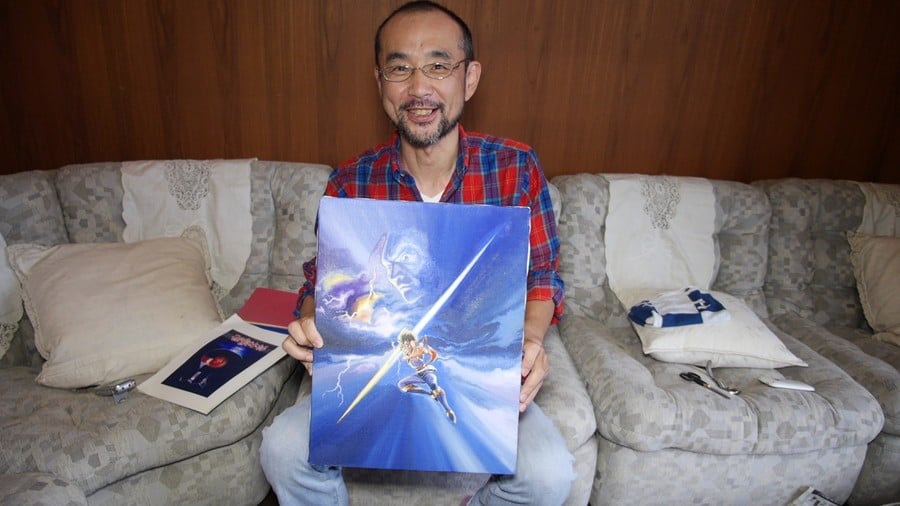
Being naïve enough to fall victim to con-artistry and deception may be forgivable, but I also should have safeguarded the contact details of the many interviewees who trusted me with them. I provided them to Hanako in the belief it would allow her to liaise with people when organising the meeting places. I had hired her believing she could act as a coordinator. Even so, I should have prevented her from accessing their contact details. This is my failing, and had I not attempted to delegate this task, she would not have had the ammunition to derail the project. I'm just lucky everyone ignored her – several sent her angry rebuttals for her unprofessional and childlike behaviour.
Agness and her followers accused me of misogyny, stating that was the root cause of all this. Untrue. This was and has always been about money. My money, which they wanted. That's why Agnes Kaku, her husband Peter Duimstra, and Hanako Abe attempted to sue me three times in the French courts. They wanted my money.
I had hired and worked with plenty of women on the trip, including interpreters, comic artists, and some of the TV producers, all with positive results. The conundrum is how to prove my innocence against such allegations? Offer up the names of the women I worked with, to act as character witnesses? That would only expose them to being targeted by the same people targeting me. It was Catch 22, readers.
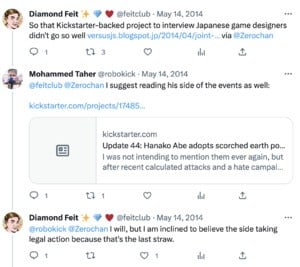
I will say this, though; I interviewed producer Rica Matsumura, discussing the challenges women and mothers face in the industry, and we've maintained a good working relationship over the years. Matsumura-san even helped me look into publishing the book in Japan. I am a supporter of women in the industry. The tragic thing about the false accusations Agness threw at me – and she also accused me of racism against Japanese people – is these accusations overshadowed and diminished the good I could have achieved.
Despite winning all three court cases and Agness being fined by the courts and ordered to pay me damages, and my shooting down a fourth court case in London thanks to the help of David Price KC, the gaming press ignored my victory. Price's letter was particularly significant, since it accuses Agness and her lawyers of abusing the legal process, their providing zero evidence, and their not even understanding libel law. The accusations against me were lies.
I felt betrayed by the press, since, during the court cases, there was an overtly malicious glee at the injustice I was suffering. It seemed everyone rallied around Agness despite the facts showing her to have lied. There is no finer example than this Twitter thread. The aforementioned Joshua Weatherford of Active Gaming Media publicly states I was a pleasure to work with, and their interpreters had no complaints. But if you scroll up, you'll see the thread starter expressing Schadenfreude at my being attacked. This was not an isolated case; many people seemed to choose Agness' side over mine – until I won three times and she was fined, at which point everyone went silent rather than showing any remorse at how they'd treated me.
The French courts and my British lawyers proved that Agness lied. The French courts even fined her for this and ordered her to pay me damages. It's ten years later and, while she was happy to force me through the legal system, she has ignored the court's demands. The overall legal costs in both the UK and France together came to over £10,000. An enormous sum of money for which I never received a penny back. I don't begrudge the lawyers, they at least did their job professionally. But that money came out of my own pocket, and instead could have gone towards transcribing the interviews faster.
It's difficult to ascertain how much damage this family brought to the project through their malicious and unprovoked behaviour. I still published all three books, albeit taking longer than needed, and no one retracted interviews. I still ended up on Japanese TV in the documentary. I was still invited to be a keynote speaker in Montreal, and invited as a guest speaker in both Leipzig and New York academic events (I lacked the funds to attend New York, sadly). The books were still consolidated into Japansoft by ROM Publishing, and subsequently published in France, with a Chinese edition due in October. Bitmap Books continues to license excerpts. I continue to receive royalties, and now freelance for Time Extension.
The work survived. Ultimately, I survived. So let's reflect on what I achieved.
A Feeling Of Disbelief
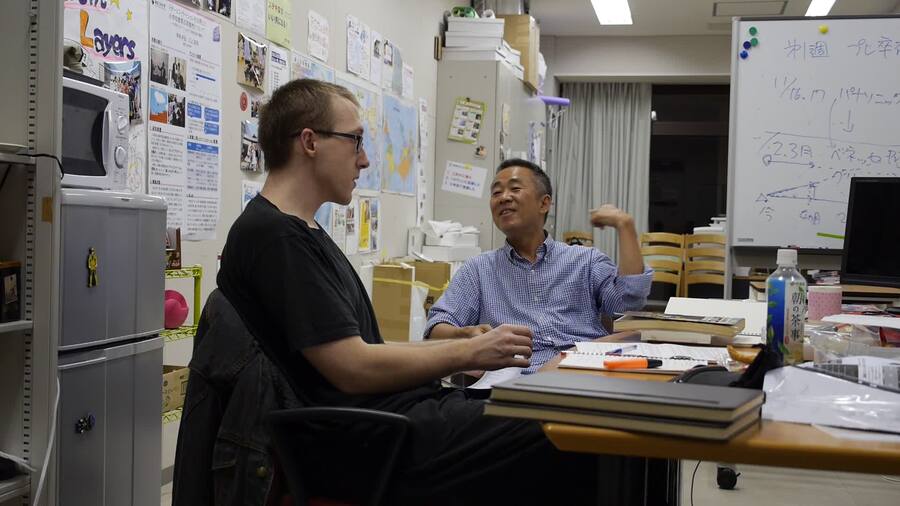
I came away from that trip with a wealth of knowledge that took five years to disseminate. Also, a maelstrom of different feelings at just how much took place – after all, in three months, I had done what a lot of journalists don't even achieve in a lifetime.
Looking back a decade later, with time to reflect, what do I now feel?
I feel an overwhelming sense of incredulity. At how little awareness Japan had of its influence on the wider world of games, and of how beloved its works are. But mostly at how little effort the Western world has put into documenting these important and easy-to-reach people, even after what I'd managed. I'm going give just one example highlighting this.
There was a film called Star Wars, which did kinda OK, and I guess at least a couple of readers have seen it. And there was a game system called the Famicom / NES, which was reasonably popular too. Anyway, there was a Star Wars game on the Famicom which was utterly bizarre, where the villain would turn into a pterodactyl. It was weird enough that magazines and YouTubers would have apoplectic meltdowns at how strange it was. Anyway, one of the guys who made it is now a known academic figure, easily reachable, lived in New Zealand for a time and knows English. So, if a reasonably popular film received an adaptation to a fairly popular system, and it was totally bizarre, and the creators are an email away, surely someone would have documented the story behind it, right?
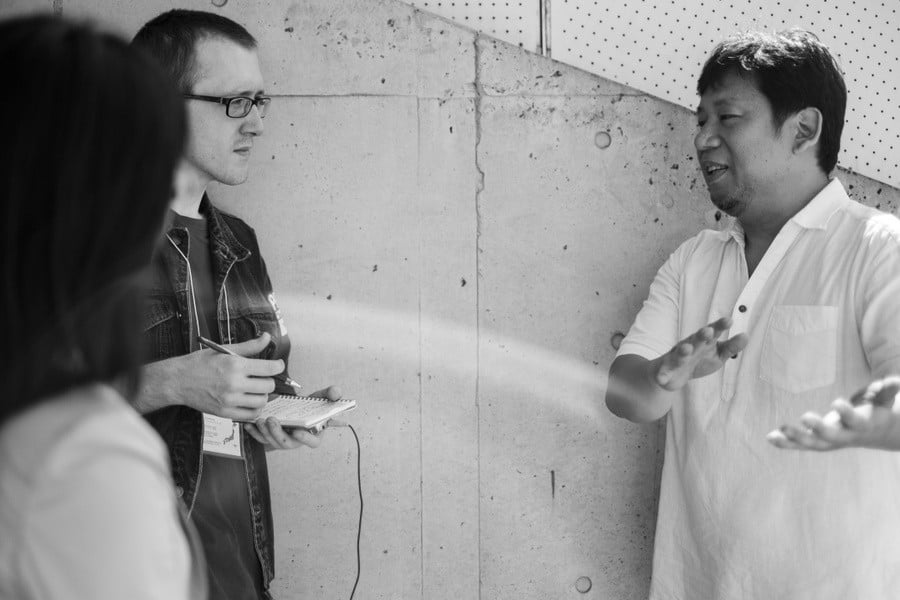
Nope. Instead, we had nothing firsthand, until I walked up the steps of the Hachioji Campus, met Professor Kishimoto in his office, and spent three hours discussing his life and career. Whereupon he gifted me a top-secret list of Namco staff and the games they worked, and I discovered that the big influence for his Star Wars game was Alex Kidd. It would be easy for this retrospective to descend into navel-gazing, and claims of "I did it first!" But being honest with you, readers, of the over 80 people I interviewed, most were easy to reach and super keen to talk. So it pains me to see so few interviews with Japanese developers by other English journalists. Fellow writers, this is low-hanging fruit; just reach out and contact someone.
Only a small selection required luck or contacts to find. One such person was the creator of Alex Kidd. Even in Japan, he had never shown his face in interviews, and no one knew where to find him. Until I was having lunch with the creator of Shinobi (Yutaka Sugano), creator of Sonic (Naoto Ohshima), and producer of OutRun (Yoji Ishii).
I mentioned Kotaro Hayashida seemed to have disappeared, whereupon Ishii-san was like (paraphrasing): "What? I've got him on speed dial. Gimme a second. <dials mobile phone, chatting> Yeah, seriously, Hayashida-san, this guy from England flew to Japan to interview us. I know, right? Yeah, he wants to discuss Alex Kidd." A couple of days later, I was in his office and discovered Alex Kidd officially started as a Dragon Ball game, but the license fell through. We also played a game of Janken (rock / paper / scissors). He won. (Or did I let him win?)
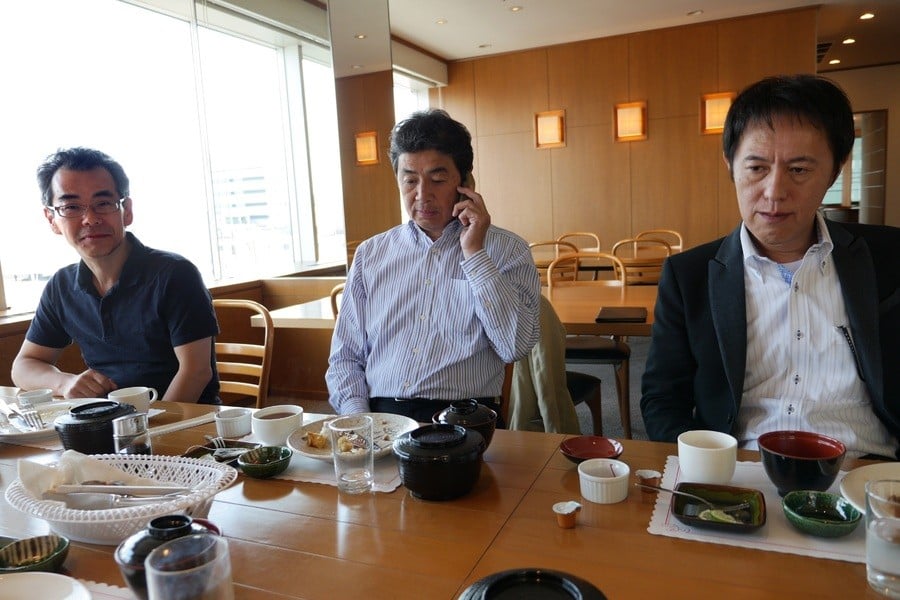
Other people who required some effort were Yoshio Kiya, creator of Legacy of the Wizard, and Kensuke Takahashi of Xainsoft – both requiring Joseph Redon of the Game Preservation Society to call in favours. But apart from these few, I actually had to turn down a long list of game developers and introductions to friends. More than one developer offered to introduce me to Hironobu Sakaguchi, the creator of Final Fantasy. I had to decline, mainly due to a lack of available time. My thinking was that, given his enormous stature, others would interview him. I wanted to get the lesser-known stories.
Here is a list of some other developers I had to decline.
Hiromasa Iwasaki offered:
- Roppyaku Tsurumi, (Sega/arcades): Spider-Man, Michael Jackson's MoonWalker
- Kenji Kaido, (Taito): Night Striker, Cameltry, Sonic Blast Man, Warrior Blade, Metal Black; (SCE): Ape Escape, Ico, Shadow of the Colossus
- Katsuhiro Nozawa, (Hudson): Star Soldier (FC), Challenger (FC), J.J. & Jeff (PCE/TG-16)
- Akira Sakuma (Hudson): Momotaro Dentetsu and Momotaro Densetsu series
- Shouji Masuda, Tengai Makyou I&II, Metal Max series, Linda Cube, Ore no Shikabane o Koete Yuke
- Jun Ii, Emerald Dragon (computers / PCE), Seiya Monogatari: Anearth Fantasy Stories
- Ichirou Mihara, Arika vice president - he knows a lot about the early Mega Man series and Street Fighter series
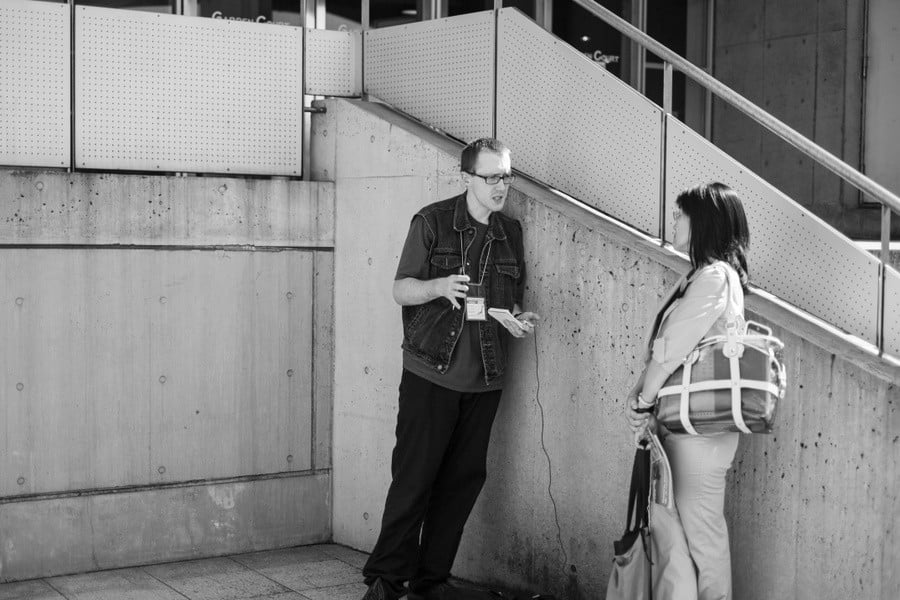
Hidenori Shibao offered:
- Tomisawa Akihito, lots of games, including Pokémon
- Kazunori Nanji, CEO of Bexide
- Tadashi Takezaki - He did public relations at Sega and is famous as a collector of Sega games - an evangelist of the Mega Drive and Dreamcast. Responsible for the direction of the hardcore homage game Segagaga
- Ryutaro Ito, main writer of Shin Megami Tensei. Familiar with myths, sports, and history, and made many games
The tragic thing is that Hidenori Shibao passed away a few years after our interview. A sombre reminder that the journalistic world needs to be doing more interviews with creators. I implore you, speak to those who created this beautiful media we call video games and record their words.
The Aftermath
Reflecting on the last ten years and what has become my legacy – because I guess I will now always be "that Englishman who went to Japan" – has been bittersweet.
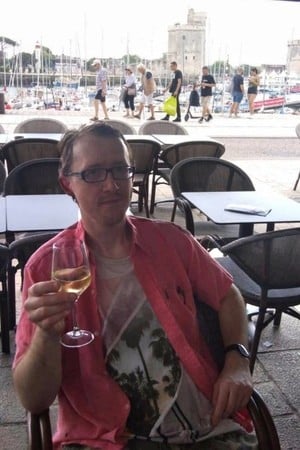
Despite the problems, it's given me many opportunities. I was flown to Montreal in 2014 on an all-expenses paid trip to be a keynote speaker at The Annual Game History Symposium. I was guest speaker in Leipzig at Replaying Japan in 2016, and got to hang out with the creator of Pac-Man. I'm still selling copies, despite CreateSpace dissolving into KDP (I'm sorry I can't update the files or change prices – they're now locked in as "legacy transfer books").
I also used the material, not just for the books, but also for preservation. I donated secret staff listings to MobyGames to update their credits. I also donated the raw materials and assets to academia, for future study. It's been gratifying to see numerous Wikipedia pages cite my work – turns out Hiroshi Suzuki was creator of the first stealth game, from 1979! Time Extension's reposting of my interviews, meanwhile, has reminded me of the value of this epic quest.
I want to thank my brother, father, and late mother for their support. They helped me to create these books through their emotional and financial support. When I struggled to pay rent, my brother set me up in his swanky London apartment. My mother counselled me each day, reminding me I had the strength and moral duty to put down any lowlife who challenged me.
I created something beautiful. I did it my way. Nobody was able to stop me. I now work in a field other than journalism, and freelancing is just a hobby. I never made enough money to justify doing this forever, anyway.
Thank you to those who supported me – please enjoy the words of game developers.
